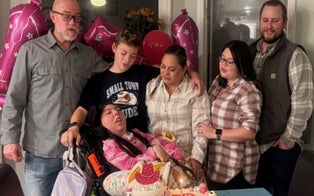Capitol Police Lt. Michael Byrd is speaking out for the first time since the Jan. 6 assault on the U.S. Capitol, just days after he was cleared of any wrongdoing.
Capitol Police Lieutenant Michael Byrd says he has no regrets about fatally shooting rioter Ashli Babbitt on Jan. 6 during the assault on the U.S. Capitol. “I know that day I saved countless lives,” Byrd told NBC News in his first interview about the event just days after having been cleared of any wrongdoing.
Byrd, who is Black, said he faced death threats and racist attacks when his name was leaked online, but he is confident in his decision to fire at that moment.
"I followed my training. I spent countless years preparing for such a moment. You ultimately hope that moment never occurs, but you prepare the best you can,” said Byrd, who has been with the Capitol Police for 28 years. "I know members of Congress, as well as my fellow officers and staff, were in jeopardy and in serious danger. And that's my job.”
He had fatally shot Babbitt, a 35-year-old Air Force veteran, during the Capitol assault. According to videos from the event, Babbitt was in a group of Trump supporters attempting to break through a set of glass doors that lead into the lobby of the House of Representatives chamber, where more 60 to 80 House members and staffers had been hiding.
“There was no way to retreat. No other way to get out,” Byrd said. “If they get through that door, they’re into the House chamber and upon the members of Congress.”
He said his police radio had been going off for several minutes with alarming messages that announced there were officers down, and rioters attacking with chemical agents, NBC News reported.
Byrd gave several warnings before firing, he said.
Babbitt had been climbing through a broken glass door when she was shot in the shoulder.
The U.S. Capitol Police's Office of Professional Responsibility ruled earlier this week that Byrd's actions that led to Babbitt's death that day was "lawful and within Department policy," and went on to note that Department policy meant "an officer may use deadly force only when the officer reasonably believes that action is in the defense of human life, including the officer’s own life, or in the defense of any person in immediate danger of serious physical injury."
Byrd will not be facing any discipline for his actions, they said.
Babbitt was one of five people who died in connection to the Capitol Assault, including two men who died of cardiovascular disease, one man who died of amphetamine intoxication and a Capitol Police officer who died after suffering two strokes.
Four additional Capitol Police officers who responded to the riot died of suicide in the months following.






